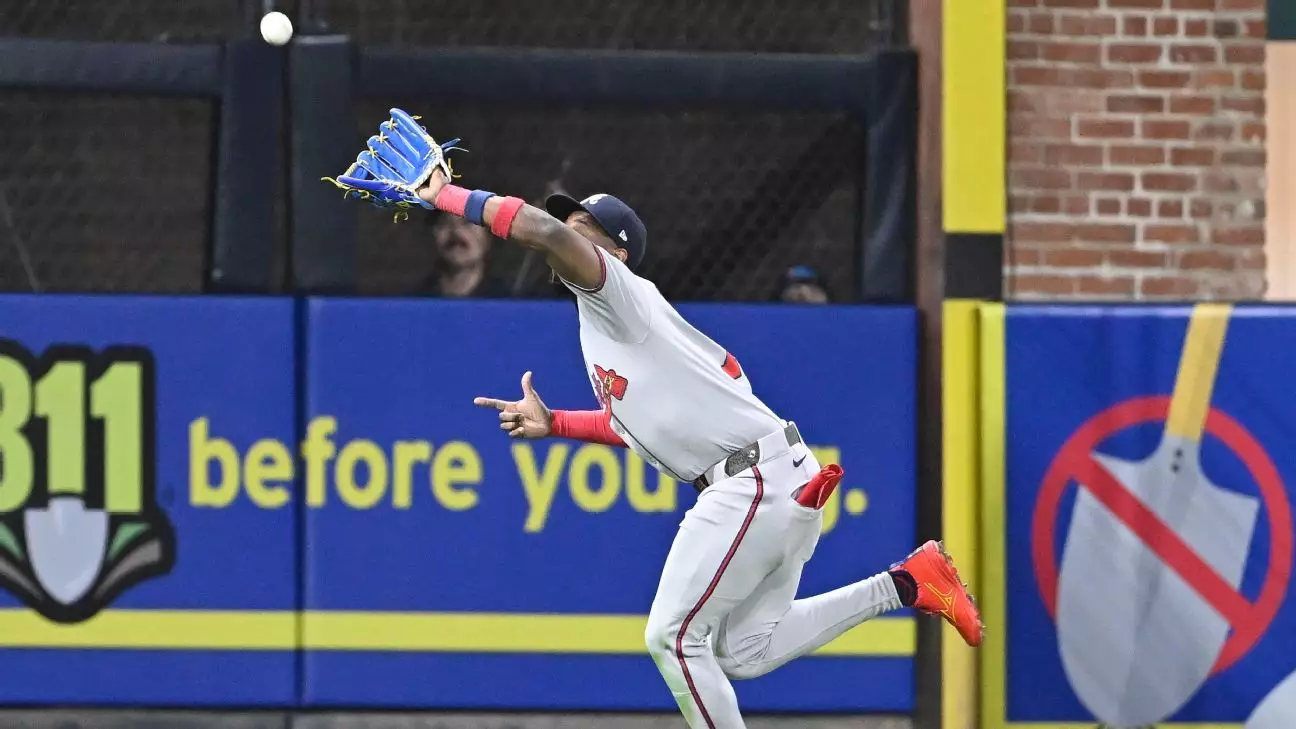In a startling turn of events, Atlanta Braves outfielder Jurickson Profar finds himself embroiled in a controversy that threatens not only his career but also the integrity of a team struggling to regain its footing. With news of his 80-game suspension due to a positive test for chorionic gonadotropin (hCG)—a performance-enhancing substance—Profar’s status as a vital player for the Braves is now marred. This isn’t just a personal setback; it marks a catastrophic loss for the Braves as they navigate the turbulent waters of the early season.
Profar’s journey in baseball has been marked by highs and lows, but in recent years, he appeared to be on an upswing after signing a lucrative three-year contract worth $42 million in January. The Braves presumably viewed his remarkable previous season, which featured a .280 batting average, 24 home runs, and 85 RBIs, as the foundation needed for offensive success. Yet, the irony is palpable: a player who struggled for so long to find his place in the league now faces a reality check that could jeopardize everything he has worked for.
Deep-Seated Regrets: Profar’s Emotional Plea
Profar’s immediate response to the news is one steeped in regret and confusion. In a heartfelt statement conveyed through the MLB Players’ Association, he characterized the day of the announcement as “the most difficult day of my baseball career.” His insistence that he had been tested multiple times before without fail raises questions about how this situation could have unfolded. Can an athlete genuinely find themselves unwittingly caught in such a predicament, or is it indicative of broader issues within the system regulating performance-enhancing drugs?
While Profar’s emotions are palpable, one has to wonder whether his words will carry the weight they deserve when weighed against the lightning-fast scrutiny of public perception and societal expectations. His lamentations about loving the game seem to echo through the empty dugouts of his teammates, as the Braves organization publicly expresses its disappointment and concern—emotions that appear to be in direct conflict with Profar’s claims of integrity.
The Braves: Navigating an Uphill Battle
As if the Braves were not already facing their own struggles—having recently been swept in a four-game series against the Padres, scoring only seven runs in total—the absence of Profar can only exacerbate their woes. The team’s current predicament has left them shorthanded, particularly with outfielder Ronald Acuña Jr. still on the injured list. Profar’s suspension presents a dual burden: the loss of a key player and the heavy emotional toll it exacts on the team dynamic.
Management’s statement conveys a mix of disappointment and support for Profar, but can any semblance of unity and morale remain intact when an integral member has fallen from grace? The implications of Profar’s actions extend far beyond his absence on the field; they ripple through the Braves’ locker room, possibly fracturing relationships among players striving to maintain focus amidst adversity. New acquisitions, like Stuart Fairchild—a recent addition from the Cincinnati Reds—might fill the roster gaps, but can they offer the same kind of cohesion and performance that Profar was expected to deliver?
The Bigger Picture: Addressing Systemic Failures
Underlying Profar’s shocking suspension is a broader conversation about the effectiveness and fairness of MLB’s Joint Prevention and Treatment Program. Could his situation be a mere symptom of structural failures within a league still grappling with how to manage athlete wellness? The friction between personal accountability and systemic flaws is evident; how much blame should fall on the individual versus the institution that sometimes fails to safeguard its players from the allure of performance enhancement?
As public empathy often wanes in the face of scandal, Profar’s narrative unveils the harsh realities athletes face: the relentless pressure to perform, the sweeping expectations of fans, and the fierce competition for staying relevant. The onus shouldn’t solely rest on players. We must interrogate a culture that often equates worth with numbers and accolades, sometimes edging individuals toward desperate measures to meet unattainable standards.
In the glare of intense scrutiny, Jurickson Profar may be facing the darkest moment of his career, but perhaps it’s time to re-examine how our systems uphold those navigating the treacherous terrains of professional sports.

Leave a Reply